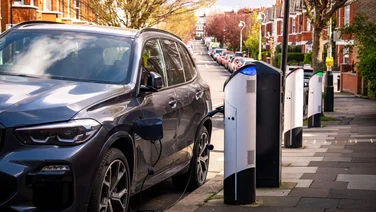We receive a small fee from trusted installers when you request a quote through our site. This helps us keep our content independent, well-researched and up to date – Learn more
- Party guarantees lower bills for good
- It will launch Great British Energy, a state-owned energy company
- The party promises to create 650,000 jobs
- London is set to become the ‘green finance capital of the world’

The Labour Party has promised to turn the UK into a “clean energy superpower” and pledged to keep energy bills permanently low in its manifesto ahead of the general election on 4 July.
In its manifesto, simply titled ‘Change’ the party said it will achieve energy independence by rapidly increasing renewable energy capacity and launching a new state-owned energy company that it said will keep costs down and protect the country from geopolitical shocks, such as the Russia-Ukraine war or supply chain disruption.
It has also vowed to keep down bills by improving the energy efficiency of UK homes with its ‘Warm Home Plans’, which will support the installation of solar panels, batteries and low carbon heating.
The Labour Party’s plans at a glance
- Guarantee “lower bills for good” by doubling onshore wind, tripling solar power, and quadrupling offshore wind by 2030.
- Launch Great British Energy, a new publicly-owned energy company, which will have £8.3 billion at its disposal for the next five years.
- Invest an extra £6.6 billion over the next parliament, doubling the existing planned government investment, to upgrade five million homes to cut bills for families.
- Introduce much tougher regulation of the National Grid to ensure companies are held to account for wrongdoing.
Guaranteeing lower energy bills
This is perhaps the Labour Party’s most eye-catching promise, and it is based on achieving energy independence and massively ramping up investment in renewable sources and also putting more money into nuclear power.
It wants to achieve zero carbon energy by 2030. To get started, it will pass what it calls the ‘Energy Independence Act’, which it said will “establish the framework” for its energy and climate policies, but there isn’t a timetable on when it plans to have this before parliament.
The emphasis on energy independence appears similar to the Conservative Party strategy, which it set out in its own manifesto earlier this week.
One significant difference is in the detail. The Conservative Party said it would create “thousands of new jobs”, without specifying how many.
On the other hand, the Labour Party has promised to create 650,000 “new high quality” jobs by 2030.
The majority of these new jobs appear to be in nuclear power. The Labour Party has said it will “ensure the long-term security” of the nuclear sector by extending the lifetime of existing plants and getting Hinkley Point C “over the line”.
Similarly to the Conservative Party, it said it will ramp up nuclear power production with new stations, such as Sizewell C and invest in Small Modular Reactors, which it insists will play “an independent role” in helping the UK achieve energy security and clean power.
One clear difference between the Labour Party and the Conservatives on energy production is on the North Sea. In their manifesto, the Conservatives said they would maintain a commitment to energy from the North Sea and monitor licences on an annual basis.
The Labour Party said it will not issue any new licences to explore new North Sea fields because they “will not take a penny off bills” and will help neither the UK energy independence nor the environment.
According to the Conservatives, scaling down North Sea energy risks 200,000 jobs. If that is true, the Labour Party would presumably hope to absorb them into the 650,000 jobs they have promised.
Electrifying industry
Continuing on the issue of jobs, Labour will launch a ‘National Wealth Fund’ that will directly invest in ports, hydrogen and industrial clusters across the UK. It will also look to secure the future of Britain’s automotive and steel industries.
Describing British industry as being “held back by electricity costs”, Labour will introduce a carbon border adjustment mechanism which will protect British industries throughout the energy transition and protect them from other countries from “dumping lower quality goods” into domestic markets.
It has also pledged to work with the City of London to mobilise trillions of pounds in private capital to make the energy transition succeed and make the UK the green finance capital of the world. It will also reverse the Conservatives’ decision to prevent the Bank of England giving due consideration to climate change in its mandates.
To incentivise the energy transition, Labour will reward clean energy developers with a ‘British Jobs Bonus’ worth up to £500 million a year from 2026, to firms who offer good jobs, terms and conditions and build manufacturing supply chains domestically.
In principle, this appears similar to the Conservatives’ plan to have made investing in manufacturing and building domestic supply chains a core of their energy independence plan.
However, the British Job Bonus and plans to raise money distinguishes the Labour plan as it offers more detail on how it will convince employers to take part in it and offers at least the framework of how it will make the energy transition work. The Conservatives’ plan lacks this.
Warm Homes Plan
The Labour Party have promised to offer grants and low interest loans to help households cut bills through insulation, solar panels and low carbon heating, to the tune of £6.6 billion by 2030.
As well as homeowners, it has pledged to help out renters as well by ensuring homes in the private rented sector meet minimum energy efficiency standards by 2030, which it said will save renters “hundreds of pounds per year”.
“We will partner with combined authorities, local and devolved governments, to roll out this plan,” it said.
“Labour will also work with the private sector, including banks and building societies, to provide further private finance to accelerate home upgrades and low carbon heating.”
Despite its promises, it is not clear how these proposed grants and loans will differ from ones already available, such as the Home Upgrade Grant (discontinued in March 2025), Warm Homes Local Grant, or the Smart Export Guarantee, or who will be eligible.
By contrast, the Liberal Democrats have offered free insulation and heat pumps for low-income households and the Conservatives have promised energy efficient technology, such as solar panels to every home in England as part of a voucher scheme.
Great British Energy
This is perhaps the policy that makes Labour stand out from the rest of the parties, as it has pledged to create a publicly-owned energy company designed to keep bills as low as possible and make the UK energy independent.
The company, to be based in Scotland, will “create jobs and build supply chains in every corner of the UK”.
Initially capitalised with £8.3 billion, Great British Energy will work with industry and trade unions to invest in technologies and deliver clean power, according to Labour.
It will work to reduce pressure on the transmission grid by focusing on local power generation, which Labour will assist by deploying more distributed production capacity through what it calls a Local Power Plan.
“We will invite communities to come forward with projects, and work with local leaders and devolved governments to ensure local people benefit directly from this energy production,” Labour said.







